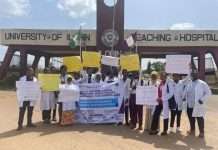
As the B.Pharm programme is being gradually phased out for the more patient-centred PharmD in the country, President of the Pharmaceutical Association of Nigeria Students (PANS), Kaduna State University (KASU), Bashir Salisu Bawa, has expressed worries over the delay in the commencement of the programme in most schools in the northern part of the country, adding his voice to those calling for a unified PharmD programme for all pharmacy schools in the country. Bawa, who is currently in his fifth year, also speaks on his foray into Pharmacy and PANS politics, the challenges of his administration and other pertinent issues. Excerpts:
Why did you opt for Pharmacy as a course of study?
Frankly speaking, Pharmacy was not my initial choice. I actually applied for Medicine. Unfortunately that year (2016), no medical student was admitted, due to some technicalities and logistics issues from the school management. I thought I had lost it all. My world felt like it was crashing.
I had no idea what Pharmacy was all about and what I could do with the degree. I had to start researching about the profession and all it promised. Eventually, after a series of researches and consultations, I learnt that I was on the right path. Besides, there is not much difference between being a medical doctor and a pharmacist. They both aim to achieve excellent healthcare delivery through prophylactic, curative and diagnostic measures.
It must be tough combining studying with active involvement in PANS activities. How have you been juggling these?
Indeed it has not been easy for me right from when I began active participation in unionism, from both within and outside our faculty. I started my political career when I was elected as the assistant editor-in-chief during my second year, under Pharmacist Mahmud Ahmed Kubau as the then pioneer PANS president.
The subsequent year, I was elected the financial secretary of PANS and served in that capacity under my predecessor, in the person of Ibrahim Aliyu. But as PANS president now, the most challenging aspect of it is the difficulty in time management. The idea is that there is a need for me to establish a balance between the leadership responsibility on my shoulders and my academic affairs. The fact that both are important has made me endure the stress and, in turn, through experience, I was able to figure out how to handle the two.
Can you tell us some of your achievements and challenges so far?
Well, many achievements have been recorded so far. Few of them will be mentioned for sake of time. There is the complete securing of PANS secretariat from the faculty management. The giant move had started with my predecessor.
Subsequent achievement was completing the requirements and making the association duly registered with the Student Affairs division of the university, which means PANS now has the legal right to execute its activities within the university without question.
Another success is making PANS more recognised within the faculty and the university as a whole. Under my administration, we also had a representative who participated in the last 46th PANS Annual National Convention, in Uyo, Akwa- Ibom State.
My biggest challenges as PANS president are in relation to my strong desire of seeing that PANS-KASU in no distant time moves forward to an become one of the best chapters we have in this country. As such, I have a mission under my administration to see that, at least, a business centre is established for PANS, so as to ease the association’s ways of sourcing for funds and to also see that the production of our annual magazine for the second time is achievable.
These are my main challenges because they require money. These days whatever plan is in place, things can never work through without adequate financial resources or sponsorship. However, we are committed and still making necessary solicitations; and we are hopeful that eventually, we shall be able to get them done.
To cut it short, financial constraint and lack of sponsorship have been the major reasons why I face challenges in executing certain activities under my administration.
What would you say are the advantages and disadvantages of studying Pharmacy here in the north, compared to those studying in other regions of the country?
Let me start by defining Pharmacy as a profession. It is a clinical health science that links medical science with chemistry and it is charged with the discovery, production, disposal, safe and effective use, and control of medications and drugs.
Right here, Pharmacy in the north is one of the most trusted and respected professions, and an individual with a pharmacy degree is respected by the people. The advantage of studying Pharmacy in the north is that there are many opportunities for fresh pharmacy graduates, whether in government or private organisations.
Internship placement for our fresh graduates tends to be easier to gain because there are few accredited pharmacy schools here, as compared with the southern part of the country. Only one university from the south may graduate and successfully induct 300 pharmacists per annum, which actually leads to increased competition in securing internship placement and there is more competition too in getting public jobs there.
The disadvantage of studying Pharmacy here in the north, from my point of view, is that we are lacking pharmaceutical industries. Only few are partially operating, which in turn is seriously affecting those that have the intention of practising in an industrial setting.
Another disadvantage is the delay in commencement of the new version of pharmacy degree, the PharmD, by our universities here, in order to meet up with the modern global standard of pharmacy education and practice. We only have Bayero University Kano (BUK) in the north as the pioneer but their faculty of pharmacy is not yet accredited by the PCN.
What do you think is wrong with the way pharmacy education is being run in Nigeria?
So far so good there are developmental changes, most especially the ongoing change from product-oriented to patient-oriented programmes. I am personally happy that there is PharmD programme now in Nigeria, but its difference from the B.Pharm. degree is not very clear.
How I wish the pharmacy curriculum could be reviewed in such a way that once a PharmD student reaches around 400 level, the student will move to a clinical setting to be trained in ward round participation, how to involve in decision-making with regard to drug therapy-related problems, the practical application of pharmacotherapeutics and how to interact directly with patients through patient counselling and rendering of appropriate pharmaceutical care.
I think this will go a long way and will make fresh graduates of Pharmacy ready to address challenges and by so doing, will enhance the recognition of pharmacy practice and its relevance to patients and other health workers.
The National Universities Commission (NUC) gave full accreditation to the Faculty of Pharmacy, KASU in 2019, with an interim accreditation status by the Pharmacists Council of Nigeria (PCN). How has it been since then?
Well, following the NUC and PCN interim accreditation, the faculty began induction of its pharmacy graduates. The pioneer inductees were 27 in number. And the faculty, ever since after PCN interim accreditation, has been undergoing restructuring – the appointment of new lecturers, laboratory technologists and equipment of various laboratories – in preparation for the next accreditation visit by the Council in other to meet up with the standard requirements.
If you had the opportunity of changing some things about pharmacy education in Nigeria, what would they be?
If I had the opportunity, I will definitely change the system to a more practical approach, where pharmacy students would have a longer hospital stay. This would definitely make the students have the minimum required skills that would make them capable of facing the realities while in practice, in order to discharge their obligations diligently.
More hospital stays would also reduce the way and manner pharmacists are being sidelined in clinical decision making and also boost inter-professional relationships with other health workers. As a result, I would also make sure that inter-professional education is in place, where the pharmacy and medical students would be attending lectures together on courses they have in common like Physiology, Anatomy, Biochemistry and Pharmacology. This will go a long way in uniting and bringing the two together at the students’ level.













